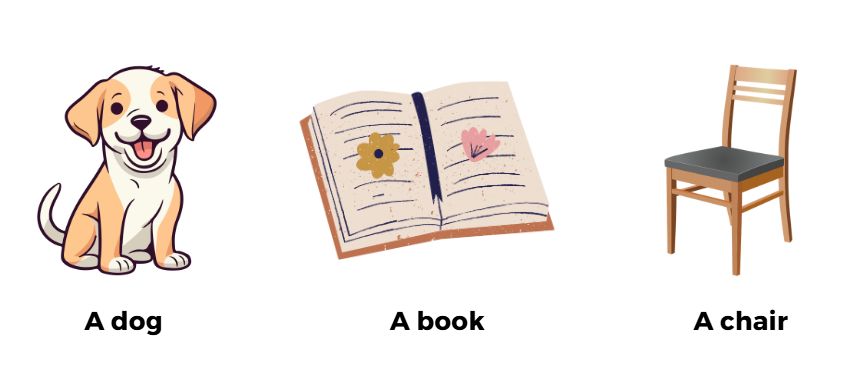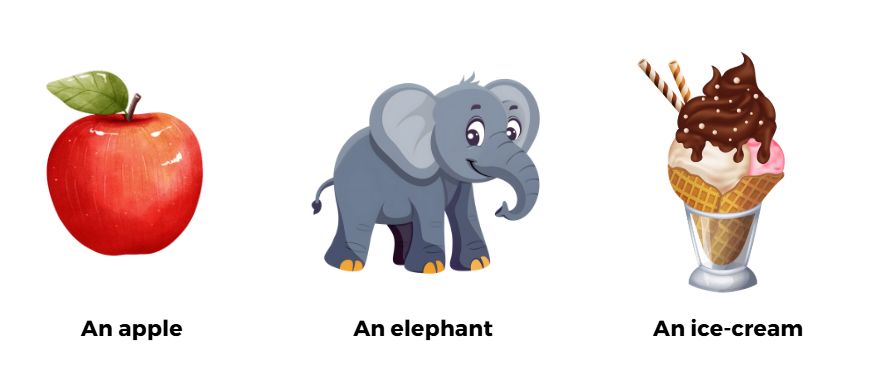Articles for class 5 English
Introductions to Articles
Articles are small words that precede nouns (things, people, places, or ideas). It helps to describe whether we refer to the specific thing or the general thing.
In English, there are three articles: A, An, and The.
1. The Indefinite Articles: A and An
We use indefinite articles when we talk about something not specific or when it is mentioned for the first time.
A
We use A when the noun that follows it starts with a consonant sound. A consonant is any letter that is not a vowel (A, E, I, O, U).
Examples:

An
We use An when the noun that follows it begins with a vowel sound (A, E, I, O, U).
Examples:

Important Rule:
The choice between A and An depends on the sound that begins the next word, not the letter.
For example:
An hour (because "hour" begins with a vowel sound, "ow-er").
A uniform (because "uniform" begins with a "yoo" sound, which is a consonant sound).
2. The Definite Article: The
The is a definite article. It is used when we talk about something specific or something that the listener already knows about.
When to use "The":
When we are talking about something that is one of a kind or unique
When we are referring to something that has already been referred to:
I saw a cat. The cat was black.
When the speaker and the listener know precisely which thing is being referred to:
The school is very close to my house.
The teacher will explain the lesson tomorrow.
With geographical names, like:
The United States
The Eiffel Tower
The Pacific Ocean
Examples of "The":
The book on the table is mine.
I visited the park yesterday.
She enjoys the music of Beethoven.
3. Articles in Sentences
A and An (Indefinite Articles)
A and An are used when referring to something for the first time or something that is not specific.
Example 1: I want a pizza. (Which pizza? Any pizza, not specific.)
Example 2: She is an artist. (Any artist, not a specific one.)
The (Definite Article)
The is used when we are talking about something specific or something that has already been mentioned.
Example 1: I saw a dog in the park. The dog was playing with a ball. (The second time we mention the dog, it's specific, so we use The.)
4. Practice Time!
Exercise 1:
Fill in the blanks with A, An or The:
-
I saw _____ elephant at the zoo.
-
_____ apple a day keeps the doctor away.
-
_____ teacher is very nice.
-
I read ____interesting book yesterday.
Exercise 2:
Correct the sentences
-
The boy found a apple under the tree.
____________________________________________________
-
She ate the sandwich for lunch.
____________________________________________________
-
I saw an dog running the street.
____________________________________________________
-
The books are on a table.
____________________________________________________
5. Tips for Using Articles
A and An are used with singular nouns.
Example: A car (singular), An apple (singular).
The can be used both singularly and plural nouns
Example: The dog (singular), The dogs (plural).
A and An is used when we are not sure about what is exactly in use
Example: I saw a cat. (I do not know which cat).
The is used when something particular is in view.
Example: The cat I saw yesterday was black. (We know which cat we're talking about.)
6. Quick Recap
A is used before words starting with a consonant sound (a dog, a book, a cat).
An is used before words starting with a vowel sound (an apple, an egg, an idea).
The is used when we are talking about something specific or something that both the speaker and listener know about (the sun, the dog I saw yesterday).
7. Conclusion
Articles are very important in English because they help us to know whether we are talking about something general or something specific. Remember:
Use A and An for general things or things we mention for the first time.
Use The for specific things, or when we know exactly what we are talking about.
Now, go ahead and practice using A, An, and The in your daily conversations and writing!
Homework:
-
Write 5 sentences using A, An and The correctly.
-
Create a short story (5-6 sentences) about your day using all three articles.

